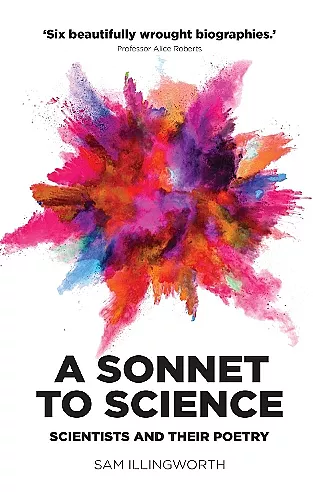A Sonnet to Science
Scientists and Their Poetry
Format:Hardback
Publisher:Manchester University Press
Published:31st May '19
Should be back in stock very soon

A sonnet to science presents an account of six ground-breaking scientists who also wrote poetry, and the effect that this had on their lives and research. How was the universal computer inspired by Lord Byron? Why was the link between malaria and mosquitos first captured in the form of a poem? Who did Humphry Davy consider to be an ‘illiterate pirate’? Written by leading science communicator and scientific poet Dr Sam Illingworth, A sonnet to science presents an aspirational account of how these two disciplines can work together, and in so doing aims to inspire both current and future generations of scientists and poets that these worlds are not mutually exclusive, but rather complementary in nature.
‘Illingworth offers six beautifully wrought biographies - finding humour, lyricism and humanity in the lives and work of these six scientist-poets.’
Alice Roberts, author of The Incredible Unlikeliness of Being and presenter of Digging for Britain, Coast and Time Team
'This excellent book is a creative collision of Hadron-like proportion, scattering fragments of intellectual curiosity, fluency and unpretentiousness across every page. One of my "discoveries" of 2019.’
Lemn Sissay, MBE
'Hard to put down! A fascinating book full of comprehensive biographies showing the development of and influences on the poet scientist, illustrated with generous amounts of poetry!'
Dame Jocelyn Bell Burnell
‘A wonderfully eclectic and uplifting collection celebrating how some of the most remarkable stories of scientific endeavour are fuelled by poetic imagining, and revealing how the gaps between well-worn facts are often infused with things poetical. Great stuff!’
Iain Stewart, Professor of Geoscience Communication, Director, Sustainable Earth Institute, University of Plymouth and Presenter on BBC Science
'By focusing on scientists who wrote poetry, A Sonnet To Science dispels the myth that scientists need to be logical and always think scientifically. It shows that poetry was practiced by the first programmer, by the discoverer of electromagnetism, and by a Nobel Prize-winning malaria researcher, so why shouldn’t other scientists dabble in poetry as well?'
Eva Amson, Forbes, August 2019
'It is a comprehensive work, sensitive to both the sciences and the poetries, and is of itself an exemplar of the importance of science communication.'
Public Understanding of Science Blog
ISBN: 9781526127983
Dimensions: unknown
Weight: unknown
224 pages